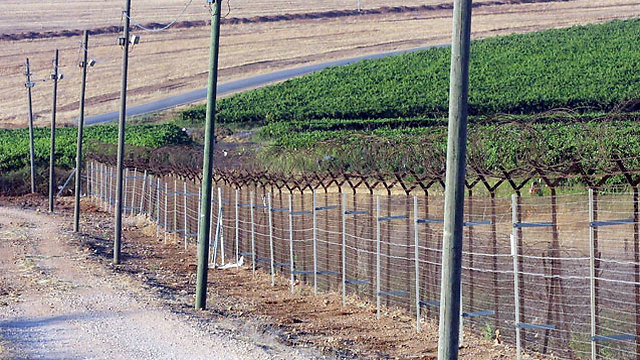Disagreement between Public Security Ministry and the Defense Ministry will leave dozens of communities on Israel’s border without a security budget beginning January 1.
By Matan Tzuri
A NIS 70 million cut to the security budget for 50 Israeli border communities will go into effect on December 31, leaving problems with the border fence unsolved, removing arms from military warehouses, and hindering the ability of security coordinators to monitor the border 7 days a week, Ynet learned on Thursday, while the Defense Ministry and Public Security Ministry both say the matter does not fall under their responsibility.

Damage to the kibbutz’s security fence will be left unfixed after the budget cut comes into effect. [illustrative]- Photo: Dan Balilty
Some of the councils will also lose their IDF Security Coordinators, while some may shift to working part time. The budget will not allow the continuation of maintenance of nearby roads and there will be no room in the remaining budget to enable workers to fix problems with the security fence – whose warnings help prevent intrusions from the south of the Hebron Mountain.
Joint administrative investigations by the Defense Ministry and the Public Security Ministry found that the border communities suffer more from criminal offenses such as theft and burglaries on farmland than security offenses. Because of this finding, the Defense Ministry decided that the responsibility to formulate the budget for the border councils lies with the Public Security Ministry.
However, the Public Security Ministry claims the exact opposite and says that the responsibility to take care of the border communities lies with the Defense Ministry.
Until the two ministries reach an agreement as to who is responsible for the budgets of these communities, the Defense Ministry has decided to cancel the budget provided to the communities. On January 1, the communities located Israel’s borders will lose their basic defense against both criminal and security threats after the freezing of their security budget.
Sources within the Defense Ministry said that the 50 councils that were transferred to the jurisdiction of the Public Security Ministry “face mainly criminal threats and farm robberies, and not terror threats. Therefore, this is the full responsibility of the Public Security Ministry. We worked together to provide the framework for this decision.”
“The criteria for allocating security funds were formulated in cooperation with the police, Border Police, and the Public Security Ministry. It was decided to transfer the 50 councils to the full responsibility of the Public Security Ministry – and the budget. The Public Security Ministry was a partner in making the decision,” sources at the Defense Ministry emphasized.
Nonetheless, the decision has angered the heads of local councils located on the borders.
The head of the Bnei Shimon Regional Council, Sigal Moran, said: “The southern region of the separation fence near the West Bank is breached and hundreds of undocumented people pass through with no problem. From Gaza they are firing rockets, and now they are canceling the budget that oversees the maintenance of patrol vehicles in the councils. Not only is the country abandoning its citizens, it is not giving them basic tools for self-protection.”
Moran says the decision is foolish: “During Operation Protective Edge, decision makers flowed into the councils, including the Defense Minister, and declared they would strengthen the sense of security for the residents. Yet, the statements made and the reality each stands alone. If, God forbid, the next attack occurs – the decision makers will not be able to clean it off their hands again. They will be forced to stutter as they did when it was decided days before Operation Protective Edge to cancel the roles of the IDF Security Coordinators in the communities surrounding the Gaza border. “
“I will not allow the security of the residents of the council to be harmed. I will not allow breached fences or the dimming of the security light. The government of Israel must wake up and understand that without security, there will be no residents here,” Moran emphasized.
Shmulik Riffman, Chairman of the Regional Councils Organization, said that within the last year he and his co-workers worked with the Defense Ministry to prevent the budget cut. “Unfortunately, although it was decided to cancel the cuts for manpower, the budget cut for the security sector remained,” said Riffman.
Chairman of the Knesset Farmers’ Lobby, MK Zvulun Kalfa (Bayit Yehudi) is a resident of Kibbutz Shomria near the border, and said: “We didn’t hear or feel that our personal security changed in the streets of Israel and especially in the communities near the border. I do not understand where the audacity comes from to cut the budget of the vital security elements that provide protection for the council, and by doing so risking the lives of many of its residents considerably.”
The Defense Ministry said, “In addition to the report compiled by the state comptroller over the past two years, a joint framework has been put together by the security forces, Israel Police and the Public Security Ministry, which decided that the 50 council will be transferred to the responsibility of the Public Security Ministry and to the Israel Police starting January 2015. This was based on analysis of the threats, the layout of IDF forces, the establishment of the security fence and additional technological measures in the field.”
The Public Security Ministry said that its workers turned to the Defense Ministry several times in order to discuss the issue and said these included “minister-level requests.”
“These requests were unanswered. We would like to emphasize that the issue is the responsibility of the Defense Ministry and the Home Front Command,” said the Public Security Ministry.
View original Ynet publication at: http://www.ynetnews.com/articles/0,7340,L-4607774,00.html






 Israeli New Shekel Exchange Rate
Israeli New Shekel Exchange Rate